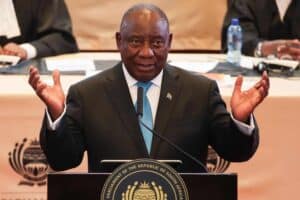Mbeki’s demand has drawn influential clerical support from Thabo Makgoba, the Archbishop of Cape Town.

The polite pretence that Cyril Ramaphosa is a trustworthy man may, at last, be winding towards an end.
When an archbishop and the party’s only vaguely successful previous leader both imply that the president may be an equivocating money launderer, at least one thing is certain: Ramaphosa has failed in his desperate attempts to assuage public scepticism over the theft of dollars hidden in a sofa.
ALSO READ: ‘No dirty dollars’ – Ramaphosa calls out DA for ‘jumping to conclusions’ about Phala Phala matter
Leading the charge is former president Thabo Mbeki. Last month, he said Ramaphosa’s explanations for Phala Phala encouraged a “suspicion” of money laundering. Mbeki also claimed that the public protector’s report that cleared Ramaphosa was “interim … not the final”.
Last week, Mbeki upped the ante with a letter to deputy ANC president Paul Mashatile. Mbeki’s demand has drawn influential clerical support from Thabo Makgoba, the Archbishop of Cape Town. Rejecting Ramaphosa’s explanations, Makgoba urged the ANC to hold the president accountable.
ALSO READ: Phala Phala: Archbishop Makgoba urges Ramaphosa to give SA answers
These developments are reminders that Phala Phala will not be easily buried. It’s a damaging setback.
At the beginning of the year, Ramaphosa briefly seemed cock-a-hoop, with things beginning to look up after great difficulties. His rivals had been conspiring to unseat him at the December elective conference. Phala Phala was a convenient stick with which to beat him.
After much stalling, parliament appointed a judicial triumvirate, headed by former chief justice Sandile Ngcobo, to investigate the constitutional ramifications. In early December, the panel reported that there was prima facie evidence that Ramaphosa might have broken his oath of office.
Its recommendation that parliament should examine the matter fully to see whether there were indeed grounds for impeachment came at the worst of possible moments.
ALSO READ: Mbeki’s meeting with ANC leaders ‘an opportunity to get guidance’
The ANC conference was just weeks away. Ramaphosa was not only politically vulnerable, but the burden of a never-ending crisis had left him on the verge of quitting. The press was alerted that a momentous announcement was imminent. But his inner circle, which had panicked by his lack of resolve, managed to prevail upon him to stay and fight.
Ramaphosa filed a direct appeal to the Constitutional Court to challenge the panel’s findings. Although of patently dubious legal merits – in March this year the court denied Ramaphosa’s application – it served its purpose and bought some immediate breathing space.
At the same time, the ANC cracked the whip in parliament. As instructed by Ramaphosa, the party’s MPs, bar one, voted to reject the report without any further discussion. Further respite.
ALSO READ: ‘Ramaphosa is not corrupt’ – Motion to establish ad-hoc committee to probe Phala Phala rejected
A fortnight later, a reinvigorated Ramaphosa smashed his rivals for leadership of the party. Further apparent vindication of his tactics came in March, when the public protector cleared Ramaphosa of Phala Phala wrongdoing.
And the final cherry on top was the virtually simultaneous statement from the SA Revenue Service that Ramaphosa and all his business entities, including Phala Phala, were tax-compliant. Game over.
Ramaphosa wins. Or so it seemed until the meddlesome Mbeki and a turbulent priest made clear that the matter is by no means resolved.
Support Local Journalism
Add The Citizen as a Preferred Source on Google and follow us on Google News to see more of our trusted reporting in Google News and Top Stories.






